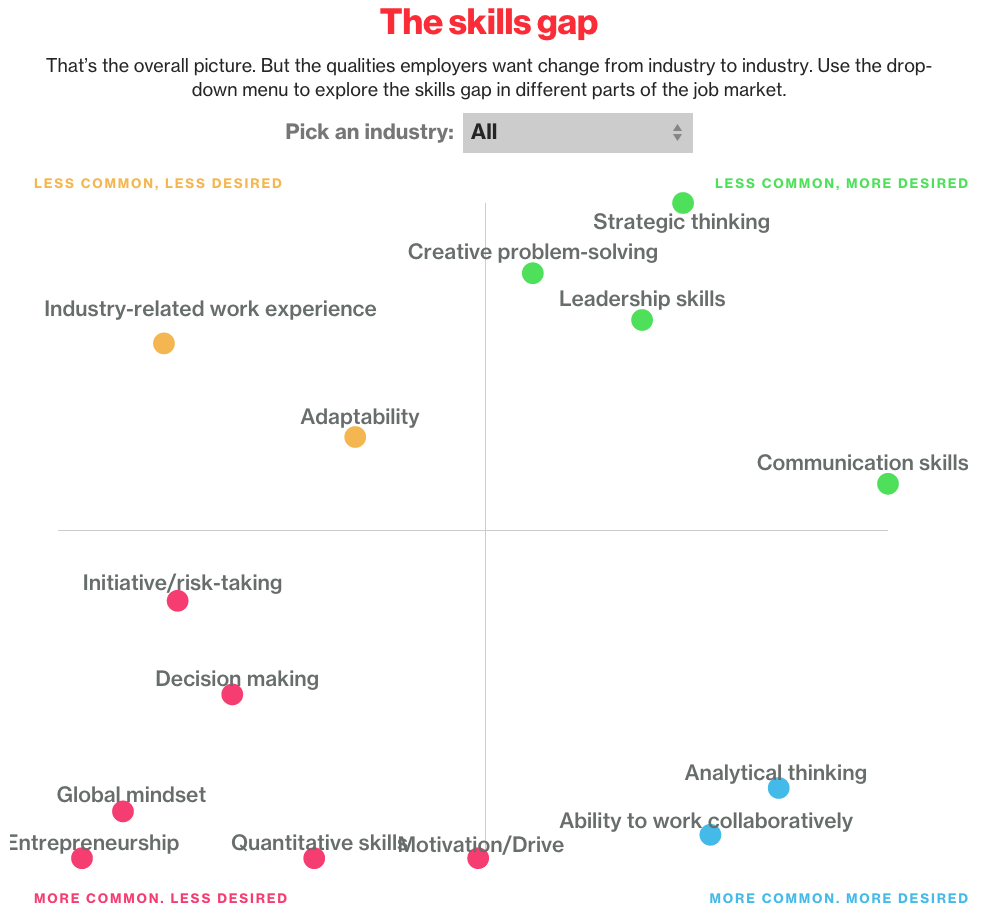Click for the full report.

Source: Bloomberg
From Bloomberg:
Business schools are supposed to produce graduates who have the abilities companies need most. But corporate recruiters say some highly sought-after skills are in short supply among newly minted MBAs. As part of our ranking of 122 top business programs, Bloomberg surveyed 1,320 job recruiters at more than 600 companies to find out which skills employers want but can’t find—and which B-schools are best at meeting the needs of the market.


And I can’t get a Tesla Model S for $20k, either.
I think the chart points out the problems in our economy. Companies are looking for strategic leaders that creatively solve problems without quantitative analysis or decision-making while showing no initiative or adaptation ability and can communicate all of this. That actually sounds like many of the executives I run into.
These characteristics are broad and hard to quantify, not as distinct as a dot for each would imply. Undoubtedly every CEO feels he or she demonstrates them all to a high degree. What trumps this kind of analysis is a simple question to ask any management job seeker, “who do you know?”
And incompetent executives tend to hire less competent people. In not too many years, nearly everyone in management is an idiot.
I remember one company where the head of our division was working his way through all of the women in his department. At a memorable company Christmas party Ms. About-to-be-former and Ms. About-to-be-next got into a fight which left both of them barely clothed. The guy had been married literally with a gun held on him by the pregnant bride’s father. Dad worked at the company, but seemed to never quite figure out what his son-in-law was doing. This branch office was so well-managed that it went from around 300 people to 3 people within a couple of years after I left.
I wish I could say that this was more than an extreme example of my experiences with large corporations. Most of my jobs later in my life were at smaller companies, and non-profit ones whenever possible. Certainly none of them were perfect, but they were almost all less pathological than the big corps.
Anecdotal, I know, but that was my experience.
Is this a chart about the needs for the next Presidential election??
I can’t address the issues regarding MBAs and the executive suite, but based on my years of
experience in the tech field, there is often a big disconnect between the hiring manager and HR
with regard to the requirements for any particular position. It’s like a game of telephone, and
by the time the personnel requisition makes it to the HR department, the requirements have been
changed and augmented into something that’s occasionally unrecognizable from what was
originally requested. Sometimes the addition of extraneous requirements is an explicit dodge so
that companies can claim, “we can’t find qualified Americans,” and thus justifies their call for
H1-B visa holders.
Another problem is that employees in the HR department simply don’t have the necessary skills or
understanding themselves to evaluate the technical skills of applicants to determine if they would
be a good fit for a position. The best they can do is match up acronyms from the job description
to those on a person’s resume, with the expected scattershot results.
Finally, companies are often looking for someone in a “sweet spot” of having just enough, but
not “too much” experience, with just the right technical skills in the same industry who has done
the same job. When they naturally can’t find enough of these people, they claim there’s a
shortage of skilled employees. There are two issues here. The first is the previously mentioned
inability of HR to recognize whether potential candidates has the ability to be successful on the
job. The second is that companies no longer wish to invest in any training or development of
employees.